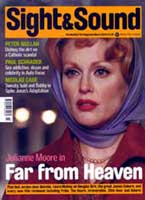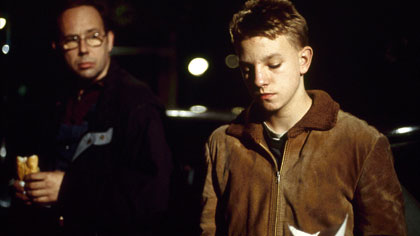
The Son
Belgium/France 2002

Reviewed by Richard Kelly
Synopsis
Our synopses give away the plot in full, including surprise twists.
Belgium, the present. Olivier (Olivier Gourmet), a carpentry instructor at a youth rehabilitation centre, covertly observes the registration of a new trainee. After first refusing, he accepts charge of the boy, and discreetly follows him back to his residence. Olivier's ex-wife Magali (Isabelle Soupart) tells him she is pregnant by her partner. Olivier calls on Magali at her workplace and tells her that Francis Thirion (Morgan Marinne), incarcerated for killing their son five years previously, has now enrolled at the centre, but that he refused to teach the boy.
While instructing Francis in the carpentry class, Olivier steals his keys and peruses his room. Having offered Francis a ride home, Olivier is confronted in the car park by Magali: he admits the boy's identity, concealing the fracas from Francis. Francis accepts Olivier's offer to accompany him to a rural lumberyard. En route Francis asks Olivier if he would be his legal guardian. Olivier questions Francis about his previous conviction: Francis describes strangling a boy while trying to steal a car radio, expressing regret only for the time he served. At the yard, Olivier tells Francis he was the father of Francis' victim. Francis flees into woodland outside. Olivier apprehends Francis, begins to throttle him, then relents and runs off. Later, as Olivier loads up his trailer, Francis reappears and assists him.
Review
Cinematically speaking, Luc and Jean-Pierre Dardenne are a modern-day miracle. They make detailed, tangible accounts of workaday life, their milieu an unlovely post-industrial Belgium; and yet these films are hinged on the gravest moral questions, their dramatic temper worthy of Sophocles or Dostoevsky. La Promesse and Rosetta were studies in conscience and betrayal; The Son weighs the balance of revenge and forgiveness.
The Dardennes are endlessly interested in what people actually do at their jobs, and here they employ their customary handheld camera to acquaint us with Olivier Gourmet's remedial joinery teacher. Ever mobile, the camera breathes down Olivier's neck: we are with him moment to moment, and the breadth of his universe is keenly encompassed. At work, he is a terse and scrupulous instructor of his juvenile charges; at home in his nondescript apartment, he heats tins of soup, performs abdominal crunches for his ailing back and repairs a leather brace he wears for his condition.
From the very first shot, however, a dramatic question has been posed. Olivier is on the horns of an obsession, its object gradually revealed to be his new apprentice, unsmiling, tow-headed Francis. The Dardennes are economical with certain bits of vital information, and so furtive and breathless is Olivier's demeanour at first that we fear some kind of erotic fixation is at play. But finally, through Olivier's awkward exchanges with ex-wife Magali, we grasp that Francis is the killer of their son, freed after juvenile detention, and doubly culpable for the devastation he left behind in a couple whose shared experience of mourning was clearly not equal to their loss.
The question thereafter is, what will Olivier do with Francis? He is outwardly inscrutable, and yet such is the camera's intimacy that eventually we sense we might have some share of his mental deliberations. Violence is always possible, and oddly portended in a sequence where Olivier instructs his class in mounting a ladder while balancing a plank on one's shoulder: Francis falters, and Olivier's shoulder-led effort to arrest his fall ends in him staggering across the courtyard in blazing distress, while Francis falls to a foetal curl on the concrete.
But in Olivier's instinctive solicitude, in the instruction itself, lies a moral. The Dardennes believe that labour is what permits the individual his or her place in society. Francis understands this just as Rosetta did: he appears serious about learning the vocation of carpentry. He is impressed by Olivier's eye for gauging metric distances between two points: the older man's talent is clearly to teach a respect for the rudiments of a discipline and its raw materials. His own life is a dead end: room in there, surely, for forgiveness? Such stirrings are anathema to Magali when she first observes them. "Who do you think you are?" she demands. "I don't know," Olivier answers. He is gauging his own instincts; and lest we imagine this is easy, Francis evinces no such remorse for his crime as might salve Olivier's (or our) misgivings.
Somehow, though, we sense how it will turn out. This may be because revenge, served hot or cold, is essentially the province of cynical genre films or arty, would-be harrowing efforts like In the Bedroom, unimprovably described by J. Hoberman as a "granola Death Wish". But when a film has claims on artistry and succeeds in articulating human pain, the viewer can hardly wish to then see further pain inflicted, upon anyone. The closest cinematic cousin to The Son is Sean Penn's The Crossing Guard (1995), in which an inconsolable Jack Nicholson is brought to an extraordinary reconciliation with the drunk driver who killed his daughter. In words that could be applied to The Son, Penn characterised his film as "an adventure into unanswerable pain, seeing what adjustments one makes in order to live on."
If this film lacks the exquisite moral tension of Rosetta, one is nevertheless loathe to make the best the enemy of the good. The weight of the film is borne by the great Gourmet, so essential to both Rosetta and La Promesse, and happily the recipient of the acting prize at Cannes for his work here. "We feel he's very close to who we are and where we come from, almost like a continuity of ourselves," remarked Jean-Pierre Dardenne upon Rosetta's release. "He sort of incarnates on screen the kind of world we want to describe in our movies." As Léaud was to Truffaut, Wayne to Ford, Chishu Ryu to Ozu, so is Gourmet to these masterful and profoundly fraternal film-makers.
Credits
- Directors
- Jean-Pierre Dardenne
- Luc Dardenne
- Producers
- Jean-Pierre Dardenne
- Luc Dardenne
- Denis Freyd
- Screenplay
- Jean-Pierre Dardenne
- Luc Dardenne
- Director of Photography
- Alain Marcoen
- Editor
- Marie-Hélène Dozo
- Art Director
- Igor Gabriel
